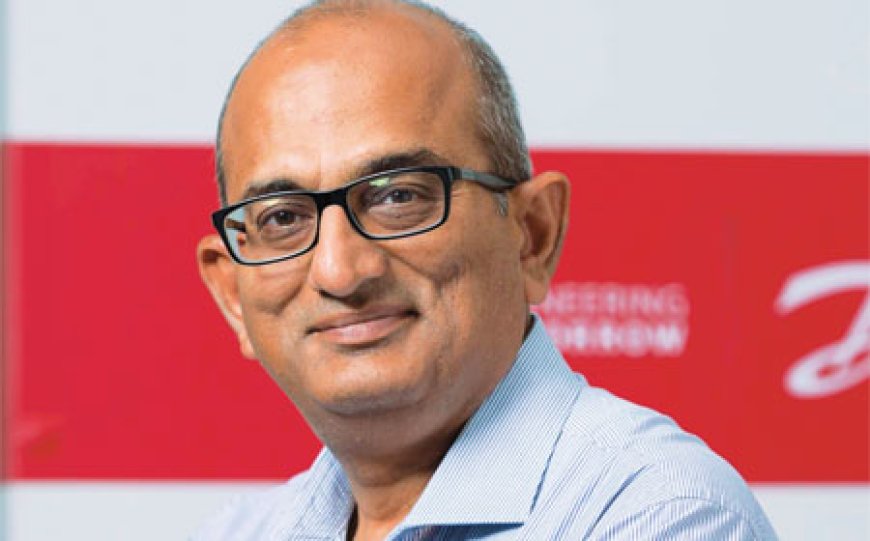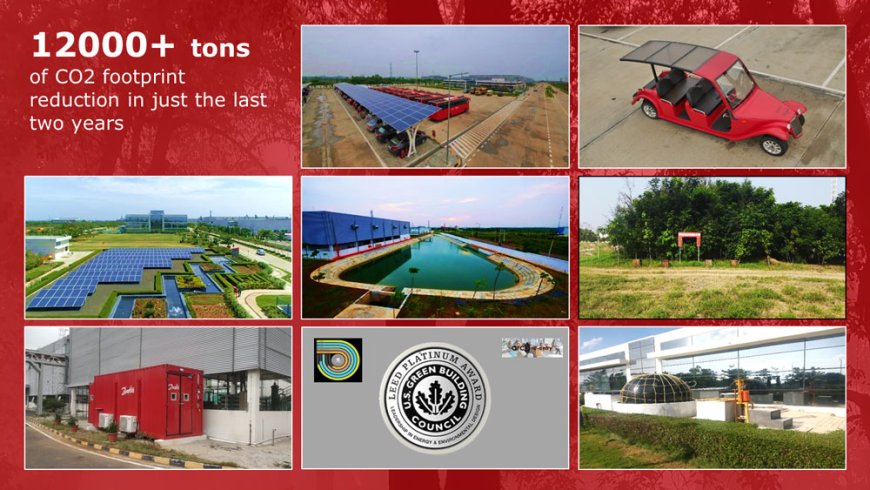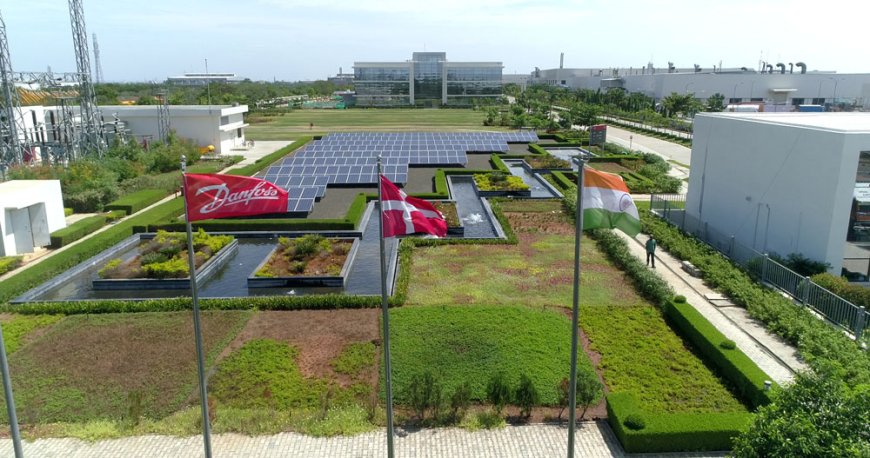Danfoss actively promotes intelligent building solutions, offering modern HVAC 4.0 solutions.

Ravichandran Purushothaman,
How is the concept of green buildings gaining traction in India?
Green buildings are gaining momentum in India due to heightened climate change awareness. Developers and homebuyers, especially millennials, are embracing sustainable practices. These resource-efficient structures minimize environmental impact by using fewer resources, water, and energy. The demand for green-certified office spaces is rising as corporations prioritize improved indoor environments and reduced operating costs.
Government initiatives, such as the Green Rating for Integrated Habitat Assessment (GRIHA), and incentives for green construction play a crucial role. Economic benefits, including cost savings, enhanced property value, and reduced operational expenses, make green buildings attractive. The market demand for eco-friendly and energy-efficient residences is growing, influencing property values positively. Moreover, green building practices contribute to a positive environmental impact by reducing greenhouse gas emissions and promoting resource efficiency. Developers, policymakers, and stakeholders are increasingly recognizing the economic benefits and environmental consciousness associated with green buildings, fostering a shift towards sustainable development in the real estate sector.
Danfoss actively promotes the expansion of green buildings in India through various initiatives and collaborations with Indian institutions advocating energy efficiency and decarbonization. By undertaking iconic green building projects in India, we are setting high standards for energy efficiency and sustainability. By acknowledging and honoring such projects, Danfoss aims to inspire the Indian infrastructure industry to adopt best practices in creating sustainable and energy-efficient buildings.
What is the latest trend in industrial and commercial buildings in adopting green practices?
The latest trend in industrial and commercial buildings adopting green practices is the integration of smart building technologies, also known as intelligent buildings. This trend aligns with the broader movement toward sustainability in the construction industry.
Intelligent buildings, utilize Building Management Systems (BMS) and other smart technologies to monitor, control, and optimize various aspects of a building's operations. This includes systems such as heating, ventilation, air conditioning (HVAC), lighting, and security. The goal is to enhance building performance, reduce energy consumption, and improve overall efficiency through real-time data analysis and automation. This trend reflects a growing recognition of the importance of leveraging technology to create more energy-efficient and environmentally conscious industrial and commercial spaces. Smart buildings contribute to the overarching goal of sustainability by optimizing resource use and reducing the environmental impact of building operations.
Danfoss actively promotes intelligent building solutions, offering modern HVAC 4.0 solutions and driving digital transformation for enhanced efficiency. The launch of the Decarbonization Centre in Chennai underscores our commitment to sustainability. With a focus on infrastructure development and collaboration with industry partners like ISHRAE, Danfoss is at the forefront of advancing energy-efficient building solutions. By integrating smart technologies, sustainable practices, and industry collaboration, we are proactively propelling the adoption of intelligent building solutions in India.
Further to these, this year’s architectural trends emphasizing on sustainability include nature-centric spaces, net-zero energy buildings, circular design principles, smart technology integration, adaptive reuse of structures, transparent and ethically sourced materials, resilient designs for climate change, and community-centric spaces. This vision reflects a future where innovation and sustainability coalesce in shaping the built environment.

What are your major achievements towards green practices and green buildings?
Danfoss has made significant achievements in promoting green practices and sustainable buildings, particularly at its Chennai campus in India:
- LEED Zero Water Certification and LEED Platinum Rating for buildings: The Chennai facility of Danfoss achieved LEED Zero Water Certification on World Water Day, the previous year, showcasing our commitment to sustainability. Over 12 months, the campus achieved zero potable water use by capturing and treating rainwater, marking it as the second Industrial Manufacturing project in India and the third globally to receive this certification. We aim for carbon neutrality across all campuses by 2030 and have reduced our carbon footprint through innovative water-efficient technologies.
- Decarbonization centre: Danfoss India's decarbonization initiative in Chennai marks a noteworthy stride towards its goal of being 100% carbon neutral by 2030. The presence of over 10,000 trees on campus, cultivated through the Miyawaki forest method, has contributed to improved air quality and a more favorable climate. The achievement signifies a strong commitment to sustainable building practices, showcasing Danfoss India's dedication to reducing its carbon footprint and contributing to a greener, environmentally friendly future.
- Renewable energy usage: In June 2020, the Chennai campus achieved a milestone by covering its entire energy consumption with 100% renewable energy, with 17% generated from an in-house solar power unit and 83% sourced from a wind energy partner.
- Carbon emissions reduction: Through these efforts, our campus in Chennai reduced CO2 emissions by 1,105 tons through solar power and an additional 609 tons through wind energy, contributing to a sustainable and greener environment.
- Energy-efficient HVAC solutions: Danfoss products, such as variable-frequency drives in HVAC units and oil-free Turbocor compressors, have contributed to a 30% reduction in energy consumption compared to conventional systems, saving 479 tons of CO2 emissions in 2020.
What are your future plans towards 100 per cent water positive?
Danfoss is poised for a water-positive future with a multi-faceted approach. The company plans to enhance water sustainability through innovations and strategic initiatives aligned with India's green energy focus. Danfoss aims to provide green technologies for smart cities, prioritize energy-efficient solutions, and invest in research and development. A key aspect of Danfoss's future plans involves collaborating with metro rail corporations to contribute to sustainable urban mobility.
In the realm of water management, Danfoss aims to revolutionize the industry by addressing the challenges posed by water scarcity, population growth, and environmental concerns. The company recognizes the critical relationship between water and energy and is committed to bridging the water-energy nexus through game-changing concepts. These concepts include energy-efficient solutions in various applications such as water desalination, irrigation and wastewater treatment plants. Danfoss's strategies encompass advanced technologies like reverse osmosis (RO), membrane bioreactors, and zero liquid discharge (ZLD) systems, all aimed at optimizing resource use, reducing energy consumption, and fostering a circular economy. The company is actively leveraging digitalization, IoT, and smart digitization to further enhance resource utilization efficiency, minimize waste, and respond proactively to water and energy shortages.
By focusing on innovation, technological integration, and strategic partnerships, Danfoss aims to set new benchmarks for sustainable and resilient urban water management, eventually achieving the ambitious goal of 100% water positivity.

What is your vision on green buildings concept in industrial buildings?
Danfoss envisions a pioneering role in fostering sustainable green building practices within industrial buildings. The company aims to create comfortable, efficient, and sustainable environments while optimizing building performance. Danfoss is committed to leading the green transition, expanding its global footprint to set a benchmark for sustainable practices within industrial infrastructure. Its vision revolves around accelerating economic recovery and generating sustainable growth through initiatives like the ‘Green Restart’ campaign.
The company focuses on demonstrating and analyzing the technical and economic advantages of intelligent control of components and systems, addressing heating and cooling solutions. Moreover, Danfoss aims to be a leading global partner with transformative technologies paving the way for the green transformation. By offering energy-efficient HVAC solutions for industrial buildings, Danfoss strives to enable these structures to become more sustainable, reinforcing its vision of creating a more environmentally responsible industrial sector. Overall, Danfoss's vision emphasizes sustainable, energy-efficient, and technologically advanced industrial buildings, setting new standards for sustainability and environmental stewardship.







